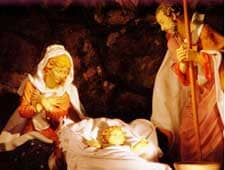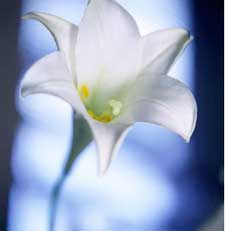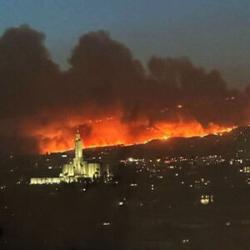By Mary Ellen Stewart Jamison and James Cannon
These three brief articles from the Encyclopedia of Mormonism summarize the two primary religious holidays Mormonism shares with Christianity (Christmas and Easter), as well as the most prominent holiday particular to Mormonism, Pioneer Day, which is not globally celebrated.
Christmas
Christmas is the holiday  when Latter-day Saints and other Christians celebrate the birth of Jesus Christ. This epochal event, seen in vision by ancient prophets, heralded the entry into mortality of the Son of God, the Jehovah of the Old Testament, and the promised Messiah. Even though Latter-day Saints believe that the birth of Jesus actually occurred in the spring of the year (D&C 20:1; see April 6), they observe the December celebration when, more than at any other time of year, the Christian world unites in remembering Christ's birth and practicing his teachings of love, charity, self-sacrifice, and tolerance.
when Latter-day Saints and other Christians celebrate the birth of Jesus Christ. This epochal event, seen in vision by ancient prophets, heralded the entry into mortality of the Son of God, the Jehovah of the Old Testament, and the promised Messiah. Even though Latter-day Saints believe that the birth of Jesus actually occurred in the spring of the year (D&C 20:1; see April 6), they observe the December celebration when, more than at any other time of year, the Christian world unites in remembering Christ's birth and practicing his teachings of love, charity, self-sacrifice, and tolerance.
Most Latter-day Saints include some of the traditions, games, decorations, music, and food associated with the Christmas customs of their homelands in their family celebrations. Such items as Christmas trees, stockings, gifts, and greeting cards add to the beauty of the holiday and are not discouraged. But the recommended focus is religious. The Church encourages family closeness, concern for neighbors, thoughtfulness for fellow workers, renewal of friendships, and acts of Christ-like love, giving, and celebration. Appropriate sermons, lessons, songs, and programs are presented in Sabbath services during the Christmas season. Latter-day Saints are cautioned that holiday shopping, decorating, and festivities should not obscure the remembrance of Christ nor hinder the quest for peace on earth.
Easter
 Easter is the Christian holiday celebrating the resurrection of Jesus Christ. After Christ died on the cross, his body was placed in a sepulcher, where it remained, separated from his spirit, until his resurrection, when his spirit and his body were reunited. Latter-day Saints affirm and testify that Jesus Christ was resurrected and lives today with a glorified and perfected body of flesh and bone. Following his resurrection, Jesus appeared first to Mary Magdalene and then to other disciples. Some were not convinced of his resurrection, believing that his appearances were those of an unembodied spirit. Jesus assured them, "Behold my hands and my feet, that it is I myself: handle me, and see; for a spirit hath not flesh and bones, as ye see me have" (Luke 24:39). He then ate fish and honey in their presence, further dispelling their doubt.
Easter is the Christian holiday celebrating the resurrection of Jesus Christ. After Christ died on the cross, his body was placed in a sepulcher, where it remained, separated from his spirit, until his resurrection, when his spirit and his body were reunited. Latter-day Saints affirm and testify that Jesus Christ was resurrected and lives today with a glorified and perfected body of flesh and bone. Following his resurrection, Jesus appeared first to Mary Magdalene and then to other disciples. Some were not convinced of his resurrection, believing that his appearances were those of an unembodied spirit. Jesus assured them, "Behold my hands and my feet, that it is I myself: handle me, and see; for a spirit hath not flesh and bones, as ye see me have" (Luke 24:39). He then ate fish and honey in their presence, further dispelling their doubt.
Easter is a celebration not only of the resurrection of Christ but also of the universal resurrection. Because of the Atonement of Jesus Christ, all people will be resurrected. Their bodies and spirits will be reunited, never to be separated again. Latter-day Saints know the truth of Paul's statement, "But now is Christ risen from the dead, and become the firstfruits of them that slept.... For as in Adam all die, even so in Christ shall all be made alive" (1 Cor. 15:20; cf. Alma 11:42-45).
Latter-day Saints conduct Easter Sunday services but do not follow the religious observances of Ash Wednesday, Lent, or Holy Week. LDS Easter services traditionally review New Testament and Book of Mormon accounts of Christ's crucifixion, his resurrection, and surrounding events. For these services, chapels are often decorated with white lilies and other symbols of life. Ward choirs frequently present Easter cantatas, and congregations sing Easter hymns. As at services on other Sundays, the emblems of the Sacrament (see Communion) are passed to the congregation.
Some LDS families include Easter bunnies and eggs in their family festivities for the delight of children. Such traditions are not officially discouraged, though they have no religious significance to Latter-day Saints. The focus of the holiday is religious. For Latter-day Saints, Easter is a celebration of the promise of eternal life through Christ. They share the conviction of Job, "For I know that my redeemer liveth, and that he shall stand at the latter day upon the earth: And though after my skin worms destroy this body, yet in my flesh shall I see God" (Job 19:25-26).




